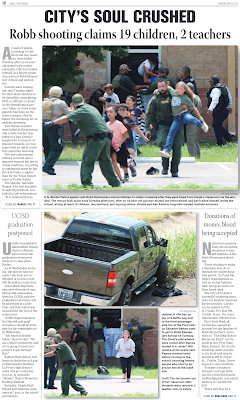 |
| Today's front page of the local twice-weekly newspaper |
By Al Cross
Director, Institute for Rural Journalism and Community Issues, University of Kentucky
In the wake of the mass shooting at Robb Elementary School in Uvalde, Texas, President Biden asked when members of Congress would have the "backbone" to "stand up to the gun lobby." But the National Rifle Association and other Second Amendment groups are not the fundamental reason the United States is unable to do much about its unique problem with deaths from firearms. The roots are in America's history and its governing structure.
Our country was forged on a frontier, in which guns were necessary for food and defense -- and also used against Native Americans. That was after they were used against the British, and that's a main reason our Constitution has a Second Amendment saying "A well regulated Militia, being necessary to the security of a free State, the right of the people to keep and bear Arms, shall not be infringed."
In those days, there were no automatic weapons, the militia was able-bodied male citizens, and the amendment was a compromise that assumed two things, according to the National Constitution Center: The new federal government would have "almost total legal authority over the army and militia," but should not have any authority at all to disarm the citizenry." Recent U.S. Supreme Court decisions, both on 5-4 votes, said the amendment creates a limited individual right to keep and bear arms. In those cases, the court may not have been following the law as much as it was following public opinion; well-organized opposition to any sort of gun control, often appealing to the national heritage of firearms, has left almost half of Americans telling a 2021 Pew Research Center poll that gun laws are "about right" or should be less strict. They have grown more gun-friendly since 2018, with the share saying "less strict" in Gallup polls rising to 11% from 4%. That could reflect a growing belief among some Americans that armed conflict among civilians is becoming more likely.
 |
| The paper's stories begin on the back page. |
Why hasn't public opinion in the last decade moved Congress on the issue? The main reason is the Senate, where each state has equal representation, giving lightly populated states with largely rural landscapes disproportionate influence. That was a compromise made even before the Bill of Rights, at the convention that wrote the Constitution, which set the structure in stone by writing, "No State, without its consent, shall be deprived of its equal Suffrage in the Senate."
So, if gun laws are to be made stricter, it's not mainly a matter of overcoming "the gun lobby." It's a probably matter of changing opinion in states with large rural populations. States like Texas. And places like Uvalde.
No comments:
Post a Comment